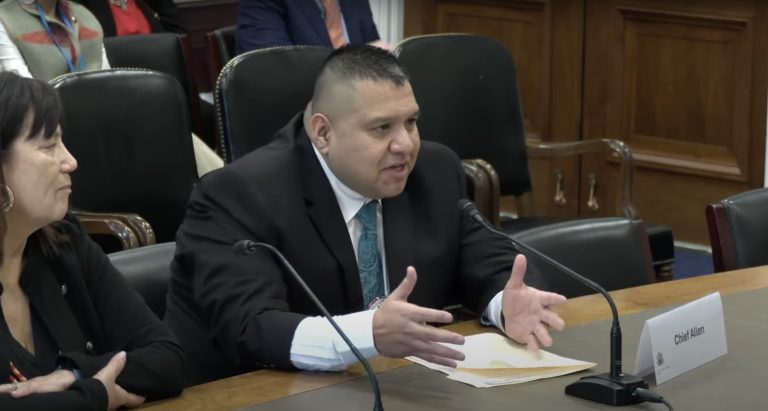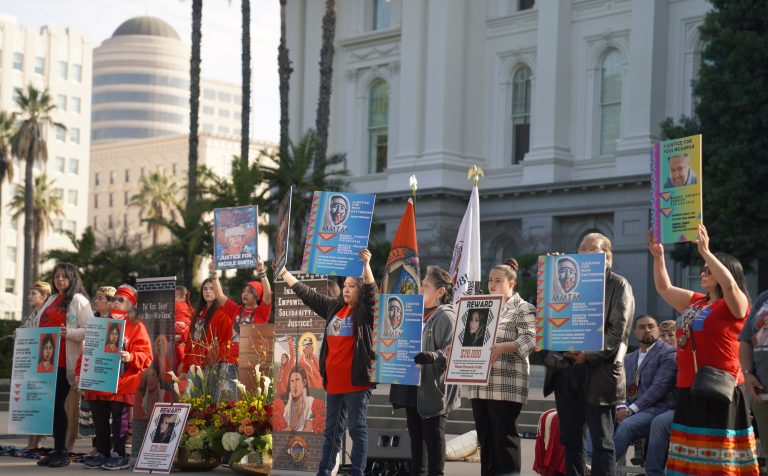Podcast: Play in new window | Download | Embed

Anchor: Antonia Gonzales
Interior Secretary Deb Haaland recently celebrated the restoration of a bison range with tribes in northwest Montana. Montana Public Radio’s Freddy Monares has this report.
Confederated Salish and Kootenai Tribes Chairman Tom MacDonald introduced Sec. Haaland to a crowd of several hundred people inside the Salish Kootenai College’s basketball gym on Saturday.
“Please let us give a big round of applause for my hero, Secretary of the Interior Deb Haaland.”
Sec. Haaland says with the loss of tribal homelands and depletion of bison herds, tribes have lost traditional connections with bison.
“But in spite of that tragedy and loss, we are still here. You are still here. And that’s something to celebrate.”
Sec. Haaland says the restoration is a culmination of Native peoples’ resilience, conservation guided by Indigenous knowledge and the Biden Administration’s commitment to honor treaty obligations. She says it’s a return to something pure and sacred.
In late 2020, Congress passed, and former president Donald Trump signed, a bill returning management of the bison range to the tribes. The federal government unlawfully took the land in the 1900s.
Chairman McDonald says the bison range is more than a restoration of land for the tribes — it’s a restoration of a piece that has been missing and a gift to pass onto future generations.
“For us to share this story and began our healing journey here with the first American woman Secretary of the Interior elicits emotions in all of us that I cannot put into words.”
 Despite the crisis of missing and murdered Indigenous people, only a small number of cases are listed in federal databases. The Mountain West News Bureau’s Robyn Vincent reports, these omissions are getting noticed and drawing frustration.
Despite the crisis of missing and murdered Indigenous people, only a small number of cases are listed in federal databases. The Mountain West News Bureau’s Robyn Vincent reports, these omissions are getting noticed and drawing frustration.
During a recent committee hearing Senator Ben Ray Lujan (D-NM) pointed out there are nearly 10,000 cases of missing and murdered Indigenous people. Yet, the combined number of cases listed by the Department of Justice and Bureau of Indian Affairs is roughly 60.
“The goal of all of us is to bring more attention here. Undermining this is going to show that, oh, don’t worry, we got it under control. No one needs to do anything, and that’s terribly wrong.”
A representative with the Bureau of Indian Affairs told the senator one reason for the dearth of info was a personnel change. He said shortly after the launch of their website, an employee responsible for data entry left.
Senator Lujan said his office is monitoring the number of cases, or lack thereof, listed in the federal databases. He urged federal officials to prioritize an issue that advocates say is slipping through the cracks.
 Nineteen U.S. Senators are requesting the Senate Committee on Indian Affairs hold a hearing on legislation to establish a truth and healing Commission on Indian boarding schools.
Nineteen U.S. Senators are requesting the Senate Committee on Indian Affairs hold a hearing on legislation to establish a truth and healing Commission on Indian boarding schools.
The commission would investigate, document, and acknowledge injustices of federal government policies, including attempts to terminate Native culture, assimilation and human rights violations. During a recent House subcommittee hearing on the House version of the bill, tribal leaders and advocates called for its passage. Shawnee Chief Ben Barnes testified.
“This commission’s purpose is not to point fingers, lay blame, or invoke guilt in people who are generations removed from these atrocities. It would simply help American Indian communities find information that would otherwise be unattainable and bring an opportunity for some assemblance of closure. We cannot go back and change the past, but we can and must hold ourselves accountable for doing the right thing today. The stories of human suffering at these institutions can no longer be hidden from view or ignored. It is time they take their place in public conscious.”
Last week, the Senators sent a letter to leadership of the Indian Affairs committee requesting a hearing.
Get National Native News delivered to your inbox daily. Sign up for our newsletter today.



